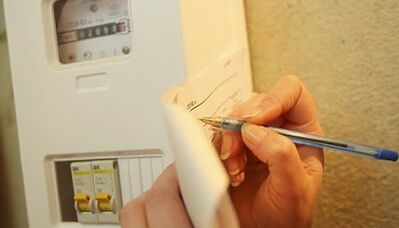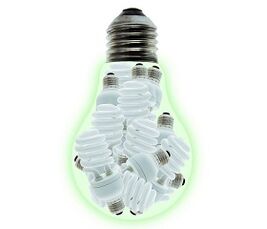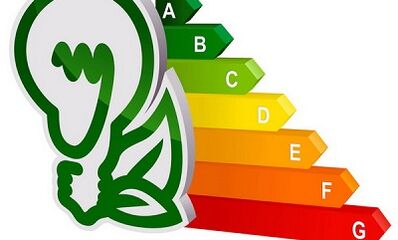The topic of saving electricity is of a lot of excitement.People continue to look for all known (and still unknown) ways how to make it more efficient.Today we will share effective ways.
Of course, some of these methods are obvious and many have used them for a long time, but nevertheless the information obtained in the form of small instructions for careful electricity consumption.
Method 1. Do we really need so much light?

All unknown statistics claim that 14% of all electricity generated are spent on lighting.But do we always use this incredible amount of extra energy without harming yourself?How to learn how to do it?
These simple tips can help you in this:
- Use electrical light as much as possible.We do not urge you to return to primitive times when people have only a daily lifestyle (although this is undoubtedly beneficial for our health: doctors have proven that the active nightlife and artificial lighting are chronic fatigue, depression and exacerbation of chronic diseases).
- Remember that the degree of illumination of the room is influenced by how many lighting devices are contaminated.It is clear that the ceiling in the kitchen, which has not been washed for several months, will be covered with a layer of dust and fat and it will be very bad to pass the light.And clean lighting devices greatly illuminate the room, which means you can use bulbs.
- Don't forget about clean windows.Natural light and sunlight will not only delay the time to turn on the lighting devices, but also warm your room in the cold season.
- It can be used when illuminating the room, for example, combined lighting: Do not turn all bulbs in the chandelier at the same time and do not turn on in combination: plug (floor lamp) and 1-2 chandelier bulbs.
- Modern energy devices can help in the economy of electricity: dimmers (rotating light regulators that smoothly change the level of light), motion sensors, pulse relays, digital switches.The automatic stopping system works very effectively at the input.
- We use energy lights (compact fluorescent, LEDs).
- And very simple - turn off the light when you leave the room (in fact this is probably the most difficult - there is a constant "war" in many houses because everyone forgets to turn off the light).
A bit about the benefits of energy lamps:
- More efficient consumption of electricity (compared to the energy of incandescent lamps 4-5 times less).
- Large light: 12W energy bulb in terms of light intensity is approximately equal to 60 watts per ordinary incandescent lamp.
- It does not emit heat in large quantities (this property can be used in small lighting devices) and distributes light more evenly and more (the usual bulb is no more than 10% of the energy consumed in light and the rest in thermal).
- The service life of the bulbs saving bulbs is longer.Although it does not always correspond to the service life of the declared manufacturer.
It is true that the latter is sometimes due to the fact that we do not use some types of light bulbs correctly.Most often, they burn in places where they are used for a short time and where the regime changes very often: "on" - "off".

If you make a gradual replacement of the bulbs, it is best to start with rooms where the bulbs work for a long time.In addition, frequent network voltage, high or, conversely, very low temperature, have a lot of effect on the period of operation.It should be borne in mind that some energy -saving lamps (fluorescent) cannot be used in devices with the brightness of the lighting.
Over time, we all have to move completely to the light bulbs saving energy, as the energy protection law states that incandescent lamps will be completely removed from circulation and replaced by more economical light sources.Therefore, it is better to start doing this in advance, because immediately replacing all bulbs is quite laid.
The undeniable disadvantage of energy bulbs is still at a high price (although now they are much cheaper than, say, 3-4 years ago), not always good quality and this, unfortunately, lacking points for receiving lamps (and such savings are very dangerous to us and ecology).
Well, if you can't replace the ordinary light bulbs, use at least a fewer bulbs.
Method 2. Multitariff measuring instruments
The question of the use of multitariff measuring instruments, of course, is not unambiguous.But considering that some household appliances work around the clock (refrigerator) or almost constantly in Sun mode (television, computers), and then take into account their work at night, this can still be beneficial not only to fans at night.
In addition, modern multitariff measuring instruments take into account electricity much more accurate than induction.
Method 3. Useful savings
First of all, let's think about using the right household appliances?
The result of these thoughts for many of us will be disappointing.It has already been proven by experts that often household appliances consume much more electricity than they need normal operation.
As we have already understood, many household appliances (microwaves, TVs, power supply, audio and video equipment, water heaters, computers, air conditioners and a dozen other devices) consume electricity not only in operating condition, but also in "waiting" or, as we often say, in Sleep mode.
Each of these devices separately consumes a lot of electricity.But if you summarize the consumption of all devices that work in Sun mode in our apartments, there are no small sums for payment on accounts at all.
For example, working hours in the "Waiting" mode for the average TV are 19 hours, for the microwave-23.8 hours, for a compact Discurer-23 hours a day.
As a result, this is 5-10% of the total consumption of electricity in the apartment.
And what is the way out?And the way out is very simple.Always turn off output devices that are not used.
Method 4. Wonders of Technology

Obviously for everyone: you can't save a lot with an old refrigerator or TV.Household appliances, manufactured 15-20 years ago, consume electricity 2 times more.
Exit from this situation: to buy modern energy -efficient household appliances.How do I know how energy efficient this device is?
To do this, carefully study the energy efficiency label that should be on household appliances.It has letter signs from A (the highest class of energy efficiency) to G (the largest).
In modern devices, the consumption of electricity, even in the waiting mode, is much smaller than in outdated models.
As a significant example of energy efficient technology, such as "smart" dishwashers or washing machines, which automatically dose the detergents, water consumption, choose the desired mode.According to experts, such devices consume 44% less energy and 62% of water than outdated models from the late 90s.
It is not worth convincing the benefits of modern technology.But what if not everyone can afford to replace old household appliances with a new (usually expensive)?How can I reduce electricity costs in this case?
Method 5. We use what we have
Refrigerator
How to use the fridge, probably everyone knows.However, we persistently continue to place it next to the batteries, the stove or near the wall on the sunny side.
But it is obvious that, heated by nearby heat sources, the fridge for effective work will consume more electricity.
In addition, it is desirable in the room to stand the refrigerator, it is not hot (about 18-20 degrees), the refrigerator should be regularly thawed and released from the ice, check its tightening (sealing the doors of the refrigerator), do not place near the wall for better air circulation.
Also, you should not buy a large refrigerator just because it is fashionable or the same with a neighbor in the kitchen (continue by the number of members of your family and its needs).The greater the refrigerator, the more it consumes energy.
Vacuum cleaner
For the normal operation of a smaller electricity vacuum cleaner, it must be regularly cleaned of accumulated dust (dirty consumes 15-20% more) and should be taken into account that it uses electricity the most when switched on and switches off (if you vacuum the small room, try not to turn off too frequently).
Electric stove
The electric stove consumes a lot of electricity.How can I reduce electricity costs in this case:
- Do not heat the oven in advance if this is not provided for a recipe for cooking a dish.
- Use the residual heat of the fireplace (excluding 5-10 minutes before the end of cooking).
- Close the pots with lids.
- Do not use excess water when cooking vegetables and eggs.
- Use good flat bottom dishes and burner size.
- Use pressure cooks.
- Use an electric kettle (consume smaller electricity than an electric stove) while buying an electric kettle sufficient in volume for the whole family and pour as much water into it as you use at some point.
- Use a microwave oven and toasters where you can prepare an equally delicious and crunchy dish in just a few minutes than in the oven.But it is much faster and therefore more economical.
Laundry
The washing machine spends up to 15% of home electricity.Use all the opportunities for economic electricity consumption that are provided by the instructions for your washing machine:
- Fast and economical washing regimens.
- Full load, but without overload (excessive load increases electricity consumption by up to 10%).
- A lower temperature (not always washed at high temperature).
- Properly selected mode of operation of the machine.
Iron
- You can also use the principle of residual heat here, that is, turn off the iron 5-10 minutes before the end of ironing.
- Not dry underwear: to caress it, you will need to spend more time and therefore use more electricity.
- Unexpected linen will also require additional electricity consumption.
- Use irons with an automatic shutdown feature.
- Use properly ironing modes for different types of fabric.
Air conditioners
- Set the temperature sufficient to cool the room properly.
- Before you turn on, make sure all windows and doors are closed.
- When you buy an air conditioner, focus on the size of the room and the number of people who will be in it.The device, designed for a large area, will simply "eat" electricity without any benefit.
- Clean the fans and filters regularly.
Computers
Almost everyone has computers today, and even one in the family.And it is clear that this significantly increases the cost of electricity.
What can we do?
- Reduce the brightness of the monitor (this affects energy consumption).
- Turn off your computer if you don't use it for a long time.
- Turn on all peripherals (scanners, printers, modems) through the network filter and always turn it off when these devices do not work.
- If possible, use liquid crystal monitors.
- Use a laptop more often (it "eats" less energy from a stationary computer).
Heaters
The cold on the street and at home makes us take the heaters from the closet.There is no heat in the house?What should I do?Study and be inclined to get sick.So you need to turn on "Eater" electricity - heaters.
To somehow reduce the time to use the heater, you need to isolate everything you can: windows, walls, floors, etc.Of course, plastic windows do this task well.Well, if the windows are ordinary, try to close all cracks and cracks within the window.It is through them that up to 50% heat disappears.The same should be done with the front doors.
And if central heating is already included, but is it still cold?
There can be many reasons.But in some cases, the simple washing of old batteries, replacing or increasing their heat transfer due to increasing with additional sections can help.
Well, try to use the heaters, if possible, not use, they are very "insatiable".
In addition, as an option for an additional source of heat in the apartment, you can consider a heated towel rail that is connected to hot water supply.
Interesting about the same

There is a very useful device.It is called "household watter".
Why is it necessary?This will help save electricity.With the help of this small device, you can learn many interesting things about the work of their household appliances and overall the cost of electricity in the house.
For example:
- How many overpayments do you do for a computer that doesn't turn off all day?
- How much electricity consumes your refrigerator and is it time to change it to a new one?
- How much electricity is consumed when washing dishes in the dishwasher, wash your laundry, hit or dry your hair?
- How much energy does your TV consume in an off state?
You will receive an answer to all these questions and many more, and you will also find out how much electricity is spent without the benefit and what you can really save on.
Obviously saving electricity is not so difficult.The main obstacle, probably, is in ourselves.As soon as we realize that not to lose electricity is profitable, first of all, for us - we will succeed.
























